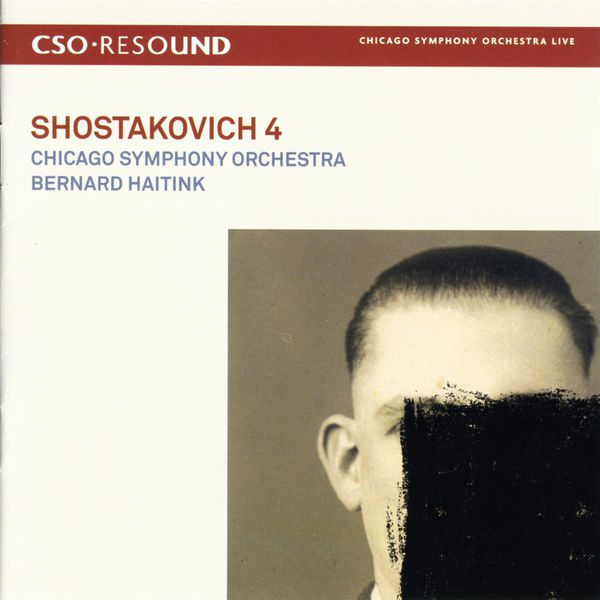
Unlimited Streaming
Listen to this album in high quality now on our apps
Start my trial period and start listening to this albumEnjoy this album on Qobuz apps with your subscription
SubscribeEnjoy this album on Qobuz apps with your subscription
Digital Download
Purchase and download this album in a wide variety of formats depending on your needs.
Language available : english
The last of Dmitry Shostakovich's youthful, experimental symphonies, the Symphony No. 4 (1935-1936) marked a critical turning point, for its modernist tendencies provoked a hostile article in Pravda, thought to have been written by Stalin himself to intimidate the composer. Because of this rebuke, the symphony was withdrawn from performance and not played again until 1961, so due to its comparatively late absorption in the repertoire, it is one of the least played of Shostakovich's symphonies. Yet this is one of his most gripping scores, full of volatile expressions and memorable ideas, and its expansive form, caustic themes, complex developments, and wide emotional range make it comparable in many ways to the symphonies of Gustav Mahler, on which it was partly modeled. Bernard Haitink and the Chicago Symphony Orchestra present this masterpiece in the CSO Resound line, and the results are breathtaking in this transparent audiophile recording. Haitink's long career of conducting Shostakovich puts him among the most authoritative interpreters, and he leads the orchestra with assurance through the work's mercurial moods and carefully guides it through treacherous technical difficulties, perhaps most impressively in the fugal flurries of the first movement's Presto section. The sound throughout is detailed, yet also spacious, so listeners have all the advantages of one without losing the other, and the crisp lines stand out all the more because of the depth of the reproduction. The symphony is paired with a bonus DVD, which features a documentary on Shostakovich, Is Music Dangerous?, with narrator Gerard McBurney and actor Nicholas Rudall, and excerpts from the CSO's performance of the Symphony No. 4.
© TiVo
You are currently listening to samples.
Listen to over 100 million songs with an unlimited streaming plan.
Listen to this playlist and more than 100 million songs with our unlimited streaming plans.
From 13,50€/month

Bernard Haitink, Conductor - Bernard Haitink, Conductor
Bernard Haitink, Conductor - Bernard Haitink, Conductor
Bernard Haitink, Conductor - Bernard Haitink, Conductor
Albumbeschreibung
The last of Dmitry Shostakovich's youthful, experimental symphonies, the Symphony No. 4 (1935-1936) marked a critical turning point, for its modernist tendencies provoked a hostile article in Pravda, thought to have been written by Stalin himself to intimidate the composer. Because of this rebuke, the symphony was withdrawn from performance and not played again until 1961, so due to its comparatively late absorption in the repertoire, it is one of the least played of Shostakovich's symphonies. Yet this is one of his most gripping scores, full of volatile expressions and memorable ideas, and its expansive form, caustic themes, complex developments, and wide emotional range make it comparable in many ways to the symphonies of Gustav Mahler, on which it was partly modeled. Bernard Haitink and the Chicago Symphony Orchestra present this masterpiece in the CSO Resound line, and the results are breathtaking in this transparent audiophile recording. Haitink's long career of conducting Shostakovich puts him among the most authoritative interpreters, and he leads the orchestra with assurance through the work's mercurial moods and carefully guides it through treacherous technical difficulties, perhaps most impressively in the fugal flurries of the first movement's Presto section. The sound throughout is detailed, yet also spacious, so listeners have all the advantages of one without losing the other, and the crisp lines stand out all the more because of the depth of the reproduction. The symphony is paired with a bonus DVD, which features a documentary on Shostakovich, Is Music Dangerous?, with narrator Gerard McBurney and actor Nicholas Rudall, and excerpts from the CSO's performance of the Symphony No. 4.
© TiVo
About the album
- 1 disc(s) - 3 track(s)
- Total length: 01:10:19
- 1 Digital booklet
- Main artist: Bernard Haitink
- Composer: Dimitri Chostakovitch
- Label: CSO Resound
- Genre: Klassiek
 Why buy on Qobuz...
Why buy on Qobuz...
-
Stream or download your music
Buy an album or an individual track. Or listen to our entire catalogue with our high-quality unlimited streaming subscriptions.
-
Zero DRM
The downloaded files belong to you, without any usage limit. You can download them as many times as you like.
-
Choose the format best suited for you
Download your purchases in a wide variety of formats (FLAC, ALAC, WAV, AIFF...) depending on your needs.
-
Listen to your purchases on our apps
Download the Qobuz apps for smartphones, tablets and computers, and listen to your purchases wherever you go.



